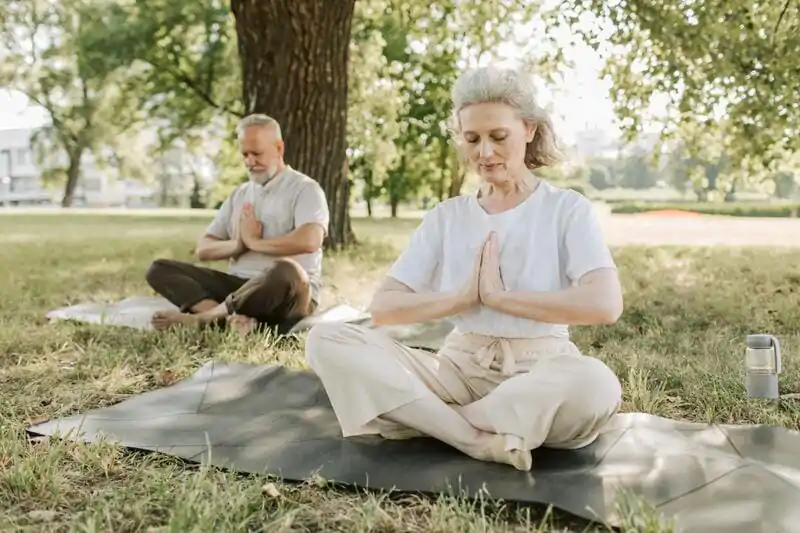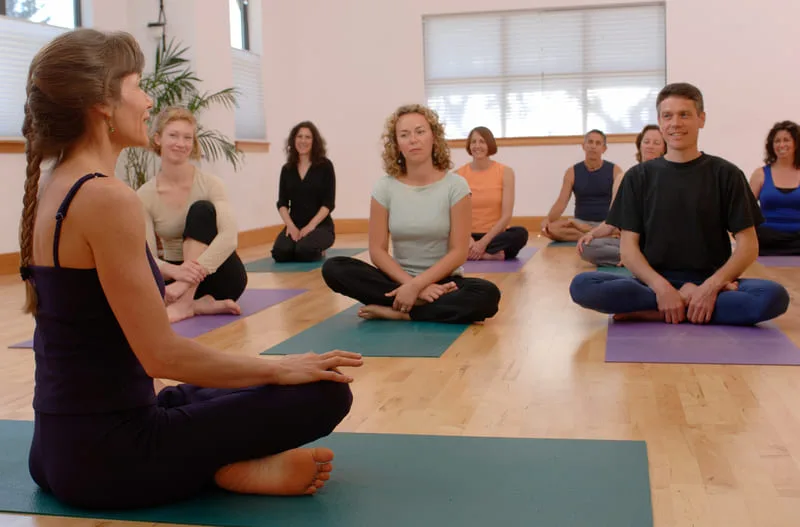Depression affects approximately 280 million people globally. It is a mental health disorder characterized by persistent feelings of sadness, hopelessness, and a lack of interest in activities. It affects how a person thinks, feels, and behaves, and therefore often interferes with their daily life.
Depression can make it challenging to connect with others and can make our minds feel foggy and forgetful. Although there are several ways to treat depression, such as with antidepressant medications and therapy, recent studies indicate that if you meditate for depression, it can be beneficial for you.
It appears that meditation can alter how our brains react to stress and anxiety, making it a potentially helpful tool to manage depression.
How Does Depression Affect You?
Depression can vary in severity from mild to severe and can manifest differently in each individual. Some common symptoms include:
- Persistent feelings of sadness or emptiness
- Loss of interest or pleasure in activities once enjoyed
- Changes in appetite and weight
- Sleep disturbances (insomnia or excessive sleeping)
- Fatigue or loss of energy
- Feelings of guilt or worthlessness
- Trouble concentrating or making decisions
- Thoughts of death or suicide
The causes of depression are complex and can vary from person to person. Certain life events such as trauma, loss, stress, or major changes can also trigger depressive episodes. It’s important to note that depression is not simply feeling sad or down temporarily.
While everyone experiences moments of sadness or grief at some point in their lives, depression is a prolonged state that significantly impacts daily functioning and wellbeing.

Depression and anxiety are common mental health conditions that can greatly impact a person’s quality of life. According to Dr. John W. Denninger, the director of research at the Benson-Henry Institute, meditation helps the brain stay focused and deal with negative thoughts, emotions, and physical sensations, especially during stressful times.
One benefit of practicing meditation in order to alleviate depression and anxiety is that it can change your way of thinking. During meditation, it is not uncommon for thoughts to wander, occasionally leading to negative ones.
However, by acknowledging these thoughts and recognizing that there is no need to give them attention or dwell on them, it becomes possible to create distance between oneself and the negativity.
Moreover, research suggests that meditation has the ability to reconfigure the brain. Specifically, certain regions of the brain have been found to undergo an increase in gray matter as a result of meditation practice. Gray matter plays a crucial role in learning, processing information, memory and constitutes approximately 40% of the human brain.
What are the Benefits of Meditation for Depression?
Here are 5 ways how you can meditate for depression and anxiety:
1. Finding Inner Calm
Meditation is like a sanctuary where we can find solace amidst life’s storms. By sitting quietly and paying attention to our breath or bodily sensations, we learn to let go of the whirlwind of thoughts and emotions. Using meditation to combat depression and reduce the intensity of depressive feelings can bring a sense of tranquility to our minds.
2. Boosting Positive Emotions
Depression can lead to a negative thought cycle, making it challenging to experience positive emotions. Using meditation to alleviate depression can cultivate positive feelings like compassion, love, and gratitude. As we practice meditation regularly, we may find it easier to shift our focus from negative thoughts to more positive and uplifting ones.
3. Enhancing Self-Awareness

Meditation encourages self-awareness. It helps us recognize negative thought patterns and triggers that contribute to depression. By practicing mindfulness meditation, we can learn to be fully present in the moment, observing our thoughts and emotions without judgment. This heightened self-awareness enables us to recognize negative thought patterns and triggers associated with depression and anxiety.
4. Building Resilience
Depression can make us feel emotionally fragile and overwhelmed by life’s challenges. If you regularly meditate for depression, it can help build resilience, allowing us to bounce back from difficult situations more effectively. By cultivating a sense of inner strength, we become better equipped to handle the ups and downs of life.
5. Improving Sleep
Insomnia and disturbed sleep are common symptoms of depression. Lack of restful sleep may also lead to anxiety. Getting enough rest and sleep is essential for you and can also help with symptoms of depression.
Meditation can also promote better sleep by calming the mind and reducing anxiety before bedtime. A more relaxed state of mind often leads to improved sleep quality, leaving individuals feeling more refreshed and better equipped to face the day.
Meditate for Depression: Why Does it Work?
The effectiveness of mindfulness meditation for depression lies in its impact on the brain and body. Research has shown that regular meditation can lead to positive changes in brain structure and function, particularly in areas associated with emotional regulation and attention. During meditation, the brain’s default mode network (DMN) becomes less active.
The DMN is a part of the brain that is involved in self-referential thoughts (thoughts that focus on oneself, such as reflecting on personal experiences, emotions, or concerns) and mind wandering. These types of thoughts are often associated with depressive rumination.
Meditation can quiet the DMN, which helps individuals escape negative thought patterns and can reduce symptoms of depression. Self-referential thoughts are thoughts that focus on oneself, such as reflecting on personal experiences, emotions, or concerns.
In short, mindfulness meditation can help depression by changing the brain and reducing negative thoughts.
Different Meditation Techniques for Depression

Here are different meditation techniques that can be effective in alleviating symptoms of depression.
1. Mindfulness Meditation
Mindfulness meditation involves focusing your attention on the present moment without judgment. By cultivating present moment awareness, individuals can learn to observe their thoughts and emotions without getting caught up in them. This practice helps to break the cycle of negative thinking and develop a more balanced perspective.
2. Loving-Kindness Meditation
Loving-kindness meditation, also known as metta meditation, involves directing well-wishes towards oneself and others. This technique fosters self-compassion and positive emotions by cultivating feelings of love, kindness, and compassion towards oneself and others. By focusing on these positive emotions, individuals with depression can counteract negative thought patterns.
3. Transcendental Meditation
Transcendental meditation (TM) is a technique that involves repeating a mantra silently in the mind to achieve a state of deep relaxation and inner peace. This technique was popularized by Maharishi Mahesh Yogi in the 1960s and has since gained widespread recognition. The mantra is chosen individually based on personal guidance from a certified teacher.
Research on TM has shown promising results in reducing stress, anxiety, and improving overall mental well-being. It is also known to increase creativity and improve focus.
It’s important to note that while these meditation techniques can be beneficial for managing depression symptoms, they should not replace professional medical treatment or therapy. It’s always recommended to consult with a healthcare professional before starting any new practices or treatments.
How Can You Practice Meditation For Depression?

If you’ve never meditated before, it might seem difficult, but it’s actually rather simple and uncomplicated, even if it does seem odd at first. Here are some effective ways to help you get started with the practice.
1. Find a quiet and comfortable space
Create a dedicated meditation space free from distractions, where you can sit comfortably with a straight back.
2. Choose a time to meditate
Select a time that works best for you, either in the morning to enhance focus and productivity, in the middle of the day during your work break, or before bed to aid in winding down for better sleep.
3. Set a timer
Begin with short meditation sessions, gradually increasing the time as you get more comfortable. Use a timer or meditation app to track the duration if you like.
4. Focus on your breath
Close your eyes, take deep breaths in through your nose and out through your mouth. Focus on the sensation of your breath and gently bring your attention back to it whenever your mind wanders.
5. Be patient
Understand that meditation is a practice that takes time to yield results. Be patient with yourself and make it a part of your daily routine for maximum benefits.
6. Find a community
Consider joining local meditation groups or online communities to deepen your practice and find support from like-minded individuals.
Starting a meditation practice for depression may feel challenging at first, but with consistent effort and patience, it can become an invaluable tool for managing your mental health.
If you want to read more about how to get started with meditation, you can read our other blog article here.
Follow your heart
Meditation can be a powerful tool for managing depression, but it’s important not to overdo it or feel frustrated when things don’t go smoothly at first. By integrating meditation into your daily routine, you can embark on a journey of healing, wellbeing, and inner peace.
If you feel like your meditative practice is getting out of hand or causing more stress than relief, take some time off from it and try again later on down the road when you’re feeling better overall.
If you are ready to take control of your mental wellbeing and embark on a journey towards inner peace and relief from depression then explore the benefits of meditation further by joining our (free!) live guided Inner Peace Sessions!







